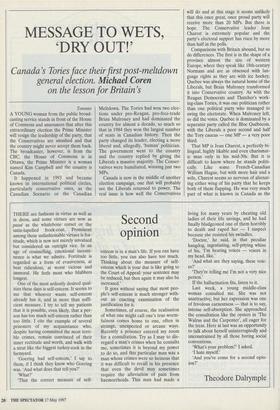Second opinion
THERE are fashions in virtue as well as in dress, and some virtues are now as passé as the whalebone corset or the satin-lapelled frock-coat. Prominent among these unfashionable virtues is for- titude, which is now not merely unvalued but considered an outright vice. In an age of counselling, emotional inconti- nence is what we admire. Fortitude is regarded as a form of evasiveness, at best ridiculous, at worst vicious and immoral. He feels most who blubbers longest.
One of the most ardently desired qual- ities these days is self-esteem. It seems to me that whoever wants self-esteem already has it, and in more than suffi- cient measure. I try to tell my patients that it is possible, even likely, that a per- son has too much self-esteem rather than too little. I cite the example of several prisoners of my acquaintance who, despite having committed the most terri- ble crimes, remain convinced of their inner rectitude and worth, and walk with a strut like the biggest turkey-cock in the farmyard.
`Goering had self-esteem,' I say to them, if I think they know who Goering was. 'And what does that tell you?'
`What?'
`That the correct measure of self- esteem is in a man's life. If you can have too little, you can also have too much. Thinking about the measure of self- esteem which is your due is like going to the Court of Appeal: your sentence may be reduced, but then again it may also be increased.'
It goes without saying that most peo- ple's self-esteem is much stronger with- out an exacting examination of the justification for it.
Sometimes, of course, the realisation of what one might call one's true worm- fulness comes home to one, often in strange, unexpected or arcane ways. Recently a prisoner entered my room for a consultation. Try as I may to dis- regard a man's crimes when he consults me, sometimes it is beyond my power to do so, and this particular man was a man whose crimes were so heinous that it was difficult to recall in his presence that even the devil may sometimes require the alleviation of pain from haemorrhoids. This man had made a living for many years by cheating old ladies of their life savings, and he had finally bludgeoned one of them horribly to death and raped her — I suspect because she resisted his swindles.
`Doctor,' he said, in that peculiar hangdog, ingratiating, self-pitying whine of his, 'I'm hearing voices — voices in my head, like.'
`And what are they saying, these voic- es?'
`They're telling me I'm not a very nice person.'
If the hallucination fits, listen to it.
Last week, a young middle-class woman consulted me. She was not unattractive, but her expression was one of frivolous earnestness — that is to say, intense self-absorption. She approached the consultation like the oysters in 'The Walrus and the Carpenter', all eager for the treat. Here at last was an opportunity to talk about herself uninterruptedly and unconstrained by all those boring social conventions.
`What's your problem?' I asked.
`I hate myself.'
`And you've come for a second opin- ion?'
Theodore Dalrymple


































































 Previous page
Previous page